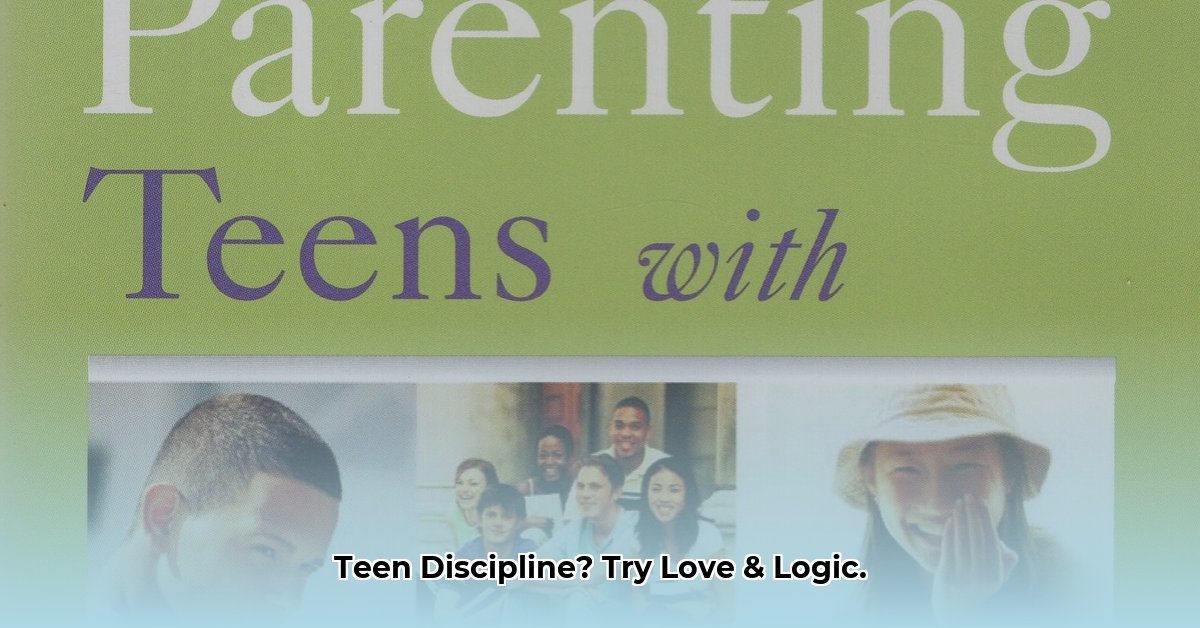Raising teenagers can be challenging. One moment they’re your best friend, the next they’re acting like you’re the worst person on earth. It’s a rollercoaster of hormones, emotions, and growth – for both of you. If you’re tired of the battles and yearn for a smoother, closer relationship with your teenager, this guide is for you. We’ll explore practical Love and Logic strategies, using real-life examples and easy-to-remember phrases. This isn’t about controlling your teen; it’s about empowering both of you to navigate adolescence and build a strong, lasting relationship. Ready to ditch the drama and start connecting? Let’s dive in.
Understanding Your Teen
While hormones play a role in teenage behavior, there’s much more happening beneath the surface. Teens grapple with identity formation, peer pressure, academic expectations, and a host of other challenges. Empathy is key. Put yourself in their shoes. Remember what it felt like to be their age. This doesn’t mean excusing bad behavior, but it does mean approaching situations with understanding and compassion. Sometimes, simply knowing they’re heard and understood can make a profound difference. Current research suggests that teens’ brains are still developing, particularly the prefrontal cortex responsible for decision-making and impulse control, which may contribute to some of their behaviors.
Sharing Control: Empowering Teens
One of Love and Logic’s core principles is shared control. This isn’t about relinquishing your authority; it’s about empowering your teen to make decisions within reasonable boundaries. Instead of issuing commands, offer choices. For example, instead of saying, “Do your homework now!” try, “Would you prefer to start with math or history homework?” This simple shift gives them ownership and agency, fostering responsibility.
Natural Consequences: Life’s Teachers
Sometimes, the most effective lessons come from experiencing the natural consequences of our actions. Forgot your lunch? You’ll probably be hungry. Stayed up too late? You might feel tired and struggle to focus. While it’s tempting to rescue our teens, allowing them to experience natural consequences (within safe limits) can be more impactful than any lecture. It teaches valuable life lessons about planning, responsibility, and decision-making. Safety always comes first; we’re talking forgotten homework, not risky situations.
Talking to Teens: Building Bridges
Communication can be tricky during adolescence. Love and Logic offers alternative phrases that can de-escalate tension and foster connection. Instead of saying, “You’re grounded!” try, “I love you too much to argue.” This phrase expresses your love while setting a boundary, avoiding power struggles.
| Love and Logic Phrase | Traditional Phrase | Why it Works |
|---|---|---|
| “Feel free to _ when you __.” | “You can’t _ until you _.” | Empowers while setting expectations. |
| “Would you like to hear my suggestion?” | “You should _.” | Offers guidance without dictating. |
| “What do you think you should do?” | “You need to _.” | Encourages problem-solving. |
| “I love you too much to argue.” | “Don’t talk back to me!” | De-escalates conflict and expresses love. |
Navigating Common Challenges
Love and Logic provides a framework for addressing defiance, disrespect, and procrastination. Defiance? Meet it with empathy and consistent consequences. Disrespect? Model respectful communication and refuse to engage. Procrastination? Allow natural consequences to unfold while offering support. Research suggests that understanding the underlying reasons for these behaviors, such as peer influence or anxiety, can help parents tailor their responses more effectively.
Setting Healthy Boundaries
Boundaries are essential for healthy development. Involve your teen in the process. Discuss expectations and consequences. Explain the reasoning behind the rules. This collaborative approach fosters buy-in and reduces resistance. Experts believe that clear and consistent boundaries provide teens with a sense of security and predictability.
Staying Connected: The Heart of It All
Amidst the challenges, prioritize connection. Make time for family dinners, game nights, or even short chats. These small moments build trust and understanding, making tougher conversations easier. Parenting teens with love and logic is about nurturing your relationship while guiding them toward responsible adulthood. It’s about enjoying the journey, even with its bumps, and arriving at the destination together.
Practical Strategies for a Stronger Relationship
Let’s explore actionable strategies for a stronger parent-teen bond.
Shared Control: Fostering Ownership
Instead of dictating, offer choices within reasonable boundaries. For example, instead of “Clean your room now!” try, “Would you prefer to tidy your room before or after dinner, as long as it’s done before screen time?” This empowers teens and reduces conflict.
Empathy Before Consequences: Connecting First
Before correcting, acknowledge feelings. If your teen slams their door, try, “I see you’re upset. Let’s talk when you’re ready.” This validates their emotions and opens communication. Some studies suggest that teens are more receptive to guidance when they feel understood and respected.
Natural & Logical Consequences: Learning Through Experience
Consequences are powerful teachers. Forgot to charge your phone? No phone until it’s charged. Skipped chores? Loss of a privilege. Connect with your teen before imposing consequences. It’s about learning, not punishment.
Guiding Questions: Nurturing Problem-Solvers
Instead of lecturing, ask open-ended questions like, “What could you have done differently?” or “What’s your plan for next time?” This encourages self-reflection and problem-solving.
Applying Principles to Everyday Challenges
From curfew to technology use, these principles apply broadly. Involve your teen in creating rules for screen time or explore their solutions for managing homework. The goal is to raise responsible adults, not compliant children.
Resources and Further Exploration
Parenting teens is a continuous learning process. Resources like Love and Logic books and workshops can provide further guidance. Explore approaches that resonate with your family and remember that current research is always evolving.
Building a Stronger Parent-Teen Bond with Love and Logic
Let’s delve deeper into how Love and Logic can strengthen the parent-teen connection.
Open Communication: Building Bridges
Open communication is crucial. Create a safe space where teens feel comfortable sharing without judgment. Actively listen and validate their feelings, even if you don’t agree with their actions. Saying things like, “I hear you’re frustrated” can make a big difference.
Understanding the Teen Brain
Teen brains are still developing. Sharing this knowledge with your teen can build empathy on both sides.
Clear Expectations and Consistent Boundaries
Teenagers need clear expectations and consistent boundaries. This provides security and helps them navigate adolescence. Focus on consequences that teach, not punishments that inflict.
Family Time: Connecting Beyond the Basics
Prioritize family dinners or other activities where you can connect without distractions. These moments strengthen bonds and create lasting memories.
Empowering with Choices
Giving teens age-appropriate choices empowers them and reduces rebellion. It could be as simple as letting them choose their outfit or offering choices within limits, like “Homework before or after dinner?”
Unwavering Support: The Anchor
Adolescence is a rollercoaster. Teens need to know they are loved unconditionally. This unwavering support is the anchor that keeps them grounded.
Remember, there’s no one-size-fits-all approach. Be present, understanding, and a steady force in their ever-changing lives.
Real-Life Examples of Love and Logic
Let’s see how Love and Logic works in real-life scenarios.
Shared Control
- Concert on a School Night: Instead of “no,” try, “You can go to the concert or study for your test. Manage the consequences.”
- Messy Room: “My car is available to take anyone with a clean room to the movies.”
Empathy First
- Not Making the Team: “That must be disappointing. It’s okay to feel upset. Have you thought about trying out again next season or exploring other activities?”
- Overwhelming Project: “That project sounds like a lot. I can see why you’re overwhelmed. Let’s break it down into smaller steps.”
Natural Consequences
- Forgotten Lunch: Resist rescuing. Hunger is a powerful reminder.
- Oversleeping: Offer a ride for a small fee, like gas money or a chore.
Enforceable Statements
- Phone at Dinner: “I enjoy conversations with people who are present. I’m happy to chat with anyone not looking at their phone.”
- Morning Rush: “I leave at 7:30.”
One-Sentence Interventions
- Screen Time Argument: “I love you too much to argue.”
- Chore Complaints: A calm and empathetic “I know.”
Love and Logic isn’t a magic bullet. Adapt the principles to your family and stay flexible. Ongoing research continues to explore parenting strategies, so stay informed and open to new ideas.
Troubleshooting Love and Logic Challenges
Love and Logic isn’t always smooth sailing. Let’s troubleshoot common challenges.
Giving Choices: Avoiding Dictatorship
Offer choices within boundaries. “Clean your room before dinner or skip screen time tonight.” This fosters ownership.
Empathy and Consequences: Finding the Balance
Acknowledge feelings before stating consequences. “I get you’re frustrated, but slamming the door isn’t okay. You’ll lose an hour of screen time.”
Natural and Logical Consequences: Reinforcing Lessons
Let natural consequences teach whenever safe. Use logical consequences when natural ones aren’t enough. Forgot to charge their phone? Loss of phone privileges.
Sidestepping Power Struggles
Avoid arguments by offering choices within existing boundaries. “Come home at 10 p.m. tonight or 9:30 p.m. next weekend.”
When It’s Not So Easy
- Teen shrugs off consequences: Brainstorm new, more effective consequences together.
- Difficulty staying calm: Prioritize self-care and seek support.
- Increased defiance: Stay consistent and seek support from other Love and Logic practitioners.
- Uncertainty about consequences: Keep them related to the misbehavior, age-appropriate, and involve your teen.
Parenting is an ongoing experiment. Love and Logic provides a framework, but be flexible and adaptable.
| Challenge | Possible Solution(s) |
|---|---|
| Teen shrugs off consequences | Brainstorm new consequences together. |
| Difficulty staying calm | Prioritize self-care, seek support. |
| Increased defiance | Maintain consistency, seek professional guidance if needed. |
| Uncertainty about consequences | Keep consequences related, age-appropriate, and involve your teen. |
Remember, it’s about building responsibility, resilience, and a stronger connection. Don’t be afraid to experiment and find what works best for your family. There are many excellent resources available, such as the Love and Logic website (https://www.loveandlogic.com/), books like “Parenting Teens with Love and Logic,” and local workshops. These resources can provide more specific examples, answer common questions, and help you connect with a supportive community of parents facing similar challenges. Parenting is a journey, and continuous learning and adaptation are key to success.
- 200+ Co-Parenting Quotes: Inspiration, Humor, and Wisdom for Every Stage - February 5, 2025
- Parenting Teens with Love and Logic: A Practical Guide to Raising Responsible Adults - February 5, 2025
- Indiana Parenting Time Guidelines PDF (2024): Download & Understand - February 4, 2025












